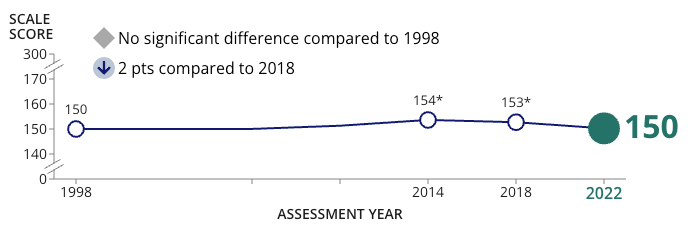Flunking Democracy

Are we educating children for citizenship?
We regularly measure schools by how well children do in math, English and science. But we expect schools to serve another essential function — they prepare children to become responsible citizens in a democracy.
We are living through a time when the direction of our democracy is debated almost daily. Are we preparing children to understand today’s issues?
- What is democracy? How do elections work?
- What is freedom of the press?
- What are the powers of the courts, the legislature, and the president?
- What does freedom mean?
Are we flunking democracy?
When it comes to teaching each new generation about our roles as citizens, both schools and parents play an important role. So how are we doing?
Civic knowledge. Every few years, the Nation’s Report Card tests eighth grade students' civic knowledge. The results are not reassuring. Year after year after decade, students have bombed the test in droves. Statistically, students in 2022 scored no better than their predecessors did in 1998.

Is eighth grade too early? Do the results improve in high school? Unfortunately not. Year after year, about half of the high school students who choose to take the AP US Government exam bomb it with a score of 1 or 2 out of five.
Civic participation. The United States trails many developed nations in voter participation. Turnout in California tends to be low compared to other states. Turnout is highest in years when presidential general elections are held.
Civility. The tone of the national dialog about civic choices has become toxic, threatening our ability to work together as citizens for the common good. We first wrote about the knuckle-dragging hazards of indignation on the Ed100 blog in 2014. The erosion of civility is of growing concern to the American Bar Association, which conducted a survey on the subject in 2023.
Turning This Around
On its own, data about the problem can't fix it, but it's a start. The decline in civics education has been a concern for a long time, prompting a steady flow of research and papers about the subject. The Conference Board also commissioned a policy backgrounder about it in 2023. The Center for American Progress studied the issue in 2018.
Done right, civic education is not just about passing a test on the Constitution in the 12th grade. It is about learning through experience how to help improve our communities, how to analyze problems, and how to work with others for the common good.
For a look at this in practice, think about how students in Parkland reacted to the horrific shooting on their campus. They modeled real civics in action. It was not serendipity. Florida has one of the most comprehensive Civics education programs in the nation according to a state profile by the Education Commission of the States: This includes “being able to identify how students can help improve their school and community (grade 1), evaluating the importance of civic responsibilities in American democracy (grade 5) and analyzing public policy solutions or courses of action to resolve a local, state, or federal issue (high school)”.
How are we doing in California?
In 2016, California changed its approach to education about civics. Rather than a single class at the end of high school, the California History-Social Science/Civics framework is meant to emphasize active learning. It involves analysis, debate, the ability to tell fake news from real news, and opportunities to create solutions. Take a look at one example of what the new civics learning looks like:
Public efforts to improve civic education tend to ebb and flow depending on the priorities and investments of election campaigns. A consistent non-partisan effort is the Civic Learning Awards, a program that spurs elementary and secondary schools to celebrate civic learning and identify successful models. The court system has also made civic learning a priority at times. [As of this writing its relevant web resources are unavailable.]
The Student Votes Campaign encourages students to register and vote. Here are some resources you can use:
- Pre-Register to Vote
- California Student Mock Election
- High School Voter Education Weeks
- California Student Vote
- Promote Democracy: Serve as a Poll Worker
Parents play an essential role.
Before the most recent election, did you discuss any issues on the ballot with your children? Elections affect them, too. Was there a parcel tax or a bond issue to support your schools? Did you take your children with you to vote? On the day of election, did you wear the “I voted” sticker to show your kids you went to the polls and were proud of it? You did vote, right? Have you spent any time with the kids talking about the issues of the day?
Family members are role models for one another. Typically, if students see that their parents value something, that value will rub off on them. Increasingly, it also works the other way around: youth voting priorities and habits can influence their parents' civic participation.
What is your school doing to improve civic learning?
You also play an important role in keeping an eye on what is happening at your school.
Your PTA can help start a discussion about civic education. Work with your principal to set up an event to help your school community understand what’s happening at your school. What are the activities? How are children learning?
Below are some questions you can use from the ECS Guidebook of Six Proven Practices of Effective Civics Education.
Tips to start the conversation |
|---|
1. Are students participating in school governance? |
2. What opportunities are available for service learning? That means a learning experience that is linked to a classroom lesson. For example, a recycling program linked to environmental studies or a school garden linked to a science curriculum. |
3. Do students participate in simulated voting, trials, legislative deliberation, or diplomacy? |
4. Are there discussions of current events and issues that affect students’ lives? |
5. Are there extracurricular activities that give students a chance to get involved and work together toward a common goal? |
6. Does classroom instruction combine formal lessons with illustrations and discussions that link the lessons to what is happening in today’s world? |
I dare ya!
Can you pass the test for new citizens?
While good citizenship is about a lot more than passing a test, knowing about our history and our constitution is important. New citizens have to pass a test. Can you?
Updated June 2024
Tags on this post
Civics Election PoliticsAll Tags
A-G requirements Absences Accountability Accreditation Achievement gap Administrators After school Algebra API Arts Assessment At-risk students Attendance Beacon links Bilingual education Bonds Brain Brown Act Budgets Bullying Burbank Business Career Carol Dweck Categorical funds Catholic schools Certification CHAMP Change Character Education Chart Charter schools Civics Class size CMOs Collective bargaining College Common core Community schools Contest Continuous Improvement Cost of education Counselors Creativity Crossword CSBA CTA Dashboard Data Dialogue District boundaries Districts Diversity Drawing DREAM Act Dyslexia EACH Early childhood Economic growth EdPrezi EdSource EdTech Education foundations Effort Election English learners Equity ESSA Ethnic studies Ethnic studies Evaluation rubric Expanded Learning Facilities Fake News Federal Federal policy Funding Gifted Graduation rates Grit Health Help Wanted History Home schools Homeless students Homework Hours of opportunity Humanities Independence Day Indignation Infrastructure Initiatives International Jargon Khan Academy Kindergarten LCAP LCFF Leaderboard Leadership Learning Litigation Lobbyists Local control Local funding Local governance Lottery Magnet schools Map Math Media Mental Health Mindfulness Mindset Myth Myths NAEP National comparisons NCLB Nutrition Pandemic Parcel taxes Parent Engagement Parent Leader Guide Parents peanut butter Pedagogy Pensions personalized Philanthropy PISA Planning Policy Politics population Poverty Preschool Prezi Private schools Prize Project-based learning Prop 13 Prop 98 Property taxes PTA Purpose of education puzzle Quality Race Rating Schools Reading Recruiting teachers Reform Religious education Religious schools Research Retaining teachers Rigor School board School choice School Climate School Closures Science Serrano vs Priest Sex Ed Site Map Sleep Social-emotional learning Song Special ed Spending SPSA Standards Strike STRS Student motivation Student voice Success Suicide Summer Superintendent Suspensions Talent Teacher pay Teacher shortage Teachers Technology Technology in education Template Test scores Tests Time in school Time on task Trump Undocumented Unions Universal education Vaccination Values Vaping Video Volunteering Volunteers Vote Vouchers Winners Year in ReviewSharing is caring!
Password Reset
Search all lesson and blog content here.
Login with Email
We will send your Login Link to your email
address. Click on the link and you will be
logged into Ed100. No more passwords to
remember!














Questions & Comments
To comment or reply, please sign in .